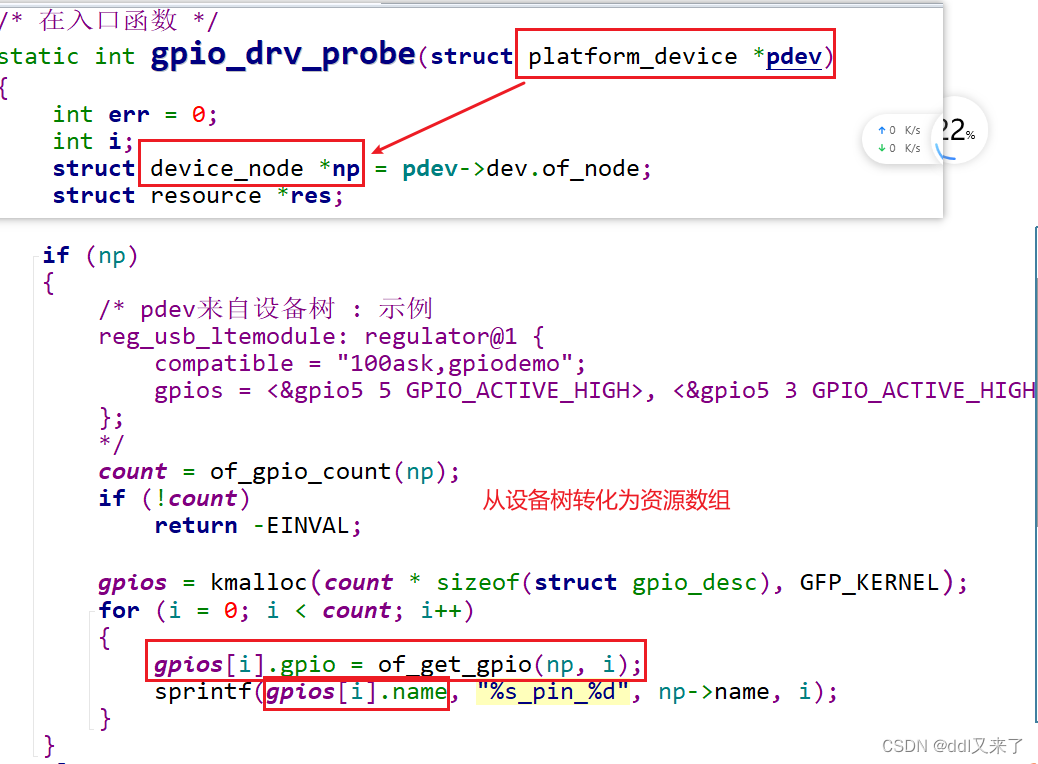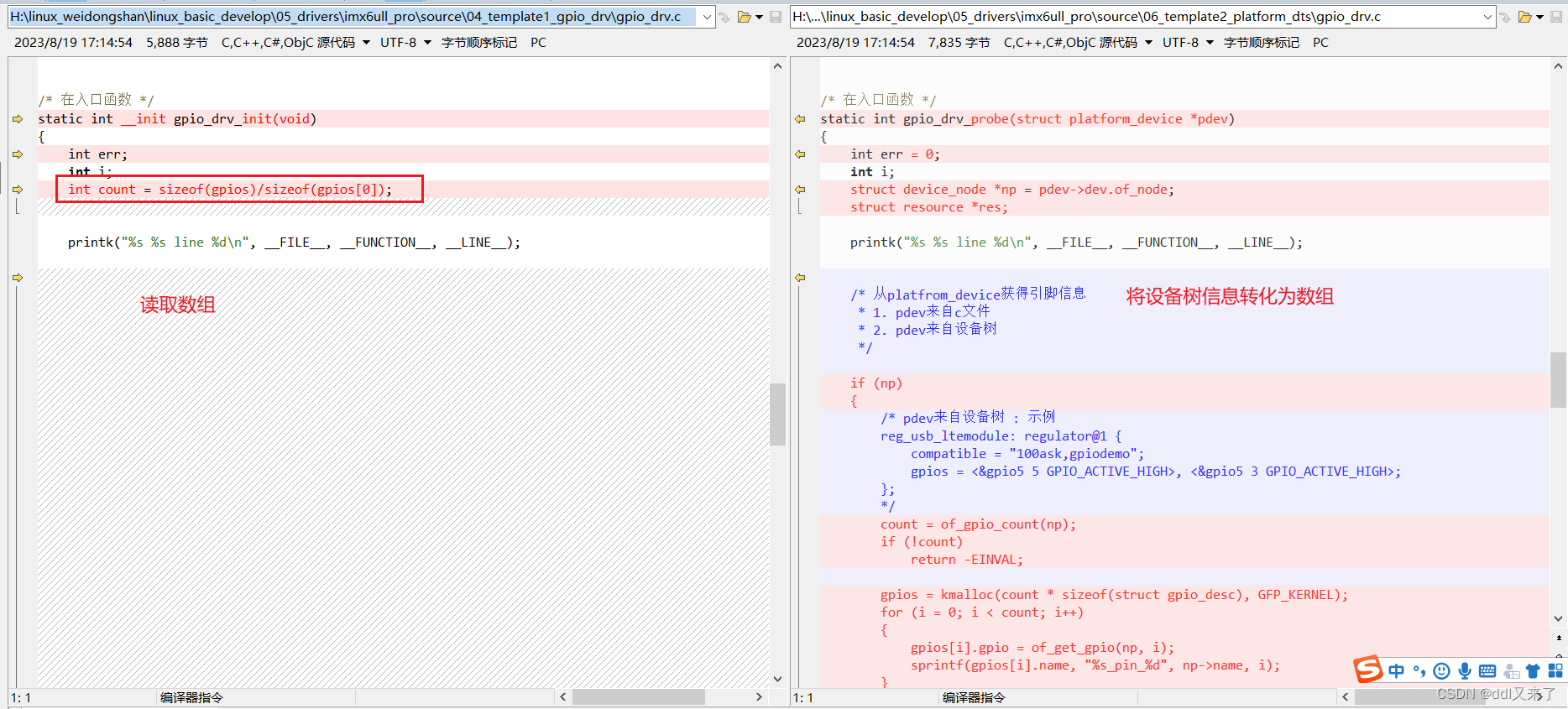写在前面:文章中的代码及截图,基本来自韦东山老师的课程。
<1>平台设备模型
平台总线的目的:当硬件接口发生变化,开发者不用再去仔细研究驱动代码,再进行接口,而是通过将驱动和硬件分离,直接修改硬件接口就可以实现代码的修改及复用。

修改硬件之后:仅仅需要修改设备树;

其他部分没大的变化;

设备树驱动模板代码:
#include <linux/module.h>
#include <linux/poll.h>
#include <linux/fs.h>
#include <linux/errno.h>
#include <linux/miscdevice.h>
#include <linux/kernel.h>
#include <linux/major.h>
#include <linux/mutex.h>
#include <linux/proc_fs.h>
#include <linux/seq_file.h>
#include <linux/stat.h>
#include <linux/init.h>
#include <linux/device.h>
#include <linux/tty.h>
#include <linux/kmod.h>
#include <linux/gfp.h>
#include <linux/gpio/consumer.h>
#include <linux/platform_device.h>
#include <linux/of_gpio.h>
#include <linux/of_irq.h>
#include <linux/interrupt.h>
#include <linux/irq.h>
#include <linux/slab.h>
#include <linux/fcntl.h>
#include <linux/timer.h>
struct gpio_desc{
int gpio;
int irq;
char name[128];
int key;
struct timer_list key_timer;
} ;
static struct gpio_desc *gpios;
static int count;
/* 主设备号 */
static int major = 0;
static struct class *gpio_class;
/* 环形缓冲区 */
#define BUF_LEN 128
static int g_keys[BUF_LEN];
static int r, w;
struct fasync_struct *button_fasync;
#define NEXT_POS(x) ((x+1) % BUF_LEN)
static int is_key_buf_empty(void)
{
return (r == w);
}
static int is_key_buf_full(void)
{
return (r == NEXT_POS(w));
}
static void put_key(int key)
{
if (!is_key_buf_full())
{
g_keys[w] = key;
w = NEXT_POS(w);
}
}
static int get_key(void)
{
int key = 0;
if (!is_key_buf_empty())
{
key = g_keys[r];
r = NEXT_POS(r);
}
return key;
}
static DECLARE_WAIT_QUEUE_HEAD(gpio_wait);
// static void key_timer_expire(struct timer_list *t)
static void key_timer_expire(unsigned long data)
{
/* data ==> gpio */
// struct gpio_desc *gpio_desc = from_timer(gpio_desc, t, key_timer);
struct gpio_desc *gpio_desc = (struct gpio_desc *)data;
int val;
int key;
val = gpio_get_value(gpio_desc->gpio);
//printk("key_timer_expire key %d %d\n", gpio_desc->gpio, val);
key = (gpio_desc->key) | (val<<8);
put_key(key);
wake_up_interruptible(&gpio_wait);
kill_fasync(&button_fasync, SIGIO, POLL_IN);
}
/* 实现对应的open/read/write等函数,填入file_operations结构体 */
static ssize_t gpio_drv_read (struct file *file, char __user *buf, size_t size, loff_t *offset)
{
//printk("%s %s line %d\n", __FILE__, __FUNCTION__, __LINE__);
int err;
int key;
if (is_key_buf_empty() && (file->f_flags & O_NONBLOCK))
return -EAGAIN;
wait_event_interruptible(gpio_wait, !is_key_buf_empty());
key = get_key();
err = copy_to_user(buf, &key, 4);
return 4;
}
static ssize_t gpio_drv_write(struct file *file, const char __user *buf, size_t size, loff_t *offset)
{
unsigned char ker_buf[2];
int err;
if (size != 2)
return -EINVAL;
err = copy_from_user(ker_buf, buf, size);
if (ker_buf[0] >= sizeof(gpios)/sizeof(gpios[0]))
return -EINVAL;
gpio_set_value(gpios[ker_buf[0]].gpio, ker_buf[1]);
return 2;
}
static unsigned int gpio_drv_poll(struct file *fp, poll_table * wait)
{
//printk("%s %s line %d\n", __FILE__, __FUNCTION__, __LINE__);
poll_wait(fp, &gpio_wait, wait);
return is_key_buf_empty() ? 0 : POLLIN | POLLRDNORM;
}
static int gpio_drv_fasync(int fd, struct file *file, int on)
{
if (fasync_helper(fd, file, on, &button_fasync) >= 0)
return 0;
else
return -EIO;
}
/* 定义自己的file_operations结构体 */
static struct file_operations gpio_key_drv = {
.owner = THIS_MODULE,
.read = gpio_drv_read,
.write = gpio_drv_write,
.poll = gpio_drv_poll,
.fasync = gpio_drv_fasync,
};
static irqreturn_t gpio_key_isr(int irq, void *dev_id)
{
struct gpio_desc *gpio_desc = dev_id;
printk("gpio_key_isr key %d irq happened\n", gpio_desc->gpio);
mod_timer(&gpio_desc->key_timer, jiffies + HZ/5);
return IRQ_HANDLED;
}
/* 在入口函数 */
static int gpio_drv_probe(struct platform_device *pdev)
{
int err = 0;
int i;
struct device_node *np = pdev->dev.of_node;
struct resource *res;
printk("%s %s line %d\n", __FILE__, __FUNCTION__, __LINE__);
/* 从platfrom_device获得引脚信息
* 1. pdev来自c文件
* 2. pdev来自设备树
*/
if (np)
{
/* pdev来自设备树 : 示例
reg_usb_ltemodule: regulator@1 {
compatible = "100ask,gpiodemo";
gpios = <&gpio5 5 GPIO_ACTIVE_HIGH>, <&gpio5 3 GPIO_ACTIVE_HIGH>;
};
*/
count = of_gpio_count(np);
if (!count)
return -EINVAL;
gpios = kmalloc(count * sizeof(struct gpio_desc), GFP_KERNEL);
for (i = 0; i < count; i++)
{
gpios[i].gpio = of_get_gpio(np, i);
sprintf(gpios[i].name, "%s_pin_%d", np->name, i);
}
}
else
{
/* pdev来自c文件
static struct resource omap16xx_gpio3_resources[] = {
{
.start = 115,
.end = 115,
.flags = IORESOURCE_IRQ,
},
{
.start = 118,
.end = 118,
.flags = IORESOURCE_IRQ,
}, };
*/
count = 0;
while (1)
{
res = platform_get_resource(pdev, IORESOURCE_IRQ, count);
if (res)
{
count++;
}
else
{
break;
}
}
if (!count)
return -EINVAL;
gpios = kmalloc(count * sizeof(struct gpio_desc), GFP_KERNEL);
for (i = 0; i < count; i++)
{
res = platform_get_resource(pdev, IORESOURCE_IRQ, i);
gpios[i].gpio = res->start;
sprintf(gpios[i].name, "%s_pin_%d", pdev->name, i);
}
}
for (i = 0; i < count; i++)
{
gpios[i].irq = gpio_to_irq(gpios[i].gpio);
setup_timer(&gpios[i].key_timer, key_timer_expire, (unsigned long)&gpios[i]);
//timer_setup(&gpios[i].key_timer, key_timer_expire, 0);
gpios[i].key_timer.expires = ~0;
add_timer(&gpios[i].key_timer);
err = request_irq(gpios[i].irq, gpio_key_isr, IRQF_TRIGGER_RISING | IRQF_TRIGGER_FALLING, "100ask_gpio_key", &gpios[i]);
}
/* 注册file_operations */
major = register_chrdev(0, "100ask_gpio_key", &gpio_key_drv); /* /dev/gpio_desc */
gpio_class = class_create(THIS_MODULE, "100ask_gpio_key_class");
if (IS_ERR(gpio_class)) {
printk("%s %s line %d\n", __FILE__, __FUNCTION__, __LINE__);
unregister_chrdev(major, "100ask_gpio_key");
return PTR_ERR(gpio_class);
}
device_create(gpio_class, NULL, MKDEV(major, 0), NULL, "100ask_gpio"); /* /dev/100ask_gpio */
return err;
}
/* 有入口函数就应该有出口函数:卸载驱动程序时,就会去调用这个出口函数
*/
static int gpio_drv_remove(struct platform_device *pdev)
{
int i;
printk("%s %s line %d\n", __FILE__, __FUNCTION__, __LINE__);
device_destroy(gpio_class, MKDEV(major, 0));
class_destroy(gpio_class);
unregister_chrdev(major, "100ask_gpio_key");
for (i = 0; i < count; i++)
{
free_irq(gpios[i].irq, &gpios[i]);
del_timer(&gpios[i].key_timer);
}
return 0;
}
static const struct of_device_id gpio_dt_ids[] = {
{ .compatible = "100ask,gpiodemo", },
{ /* sentinel */ }
};
static struct platform_driver gpio_platform_driver = {
.driver = {
.name = "100ask_gpio_plat_drv",
.of_match_table = gpio_dt_ids,
},
.probe = gpio_drv_probe,
.remove = gpio_drv_remove,
};
static int __init gpio_drv_init(void)
{
/* 注册platform_driver */
return platform_driver_register(&gpio_platform_driver);
}
static void __exit gpio_drv_exit(void)
{
/* 反注册platform_driver */
platform_driver_unregister(&gpio_platform_driver);
}
/* 7. 其他完善:提供设备信息,自动创建设备节点 */
module_init(gpio_drv_init);
module_exit(gpio_drv_exit);
MODULE_LICENSE("GPL");






















 585
585











 被折叠的 条评论
为什么被折叠?
被折叠的 条评论
为什么被折叠?








